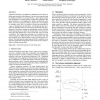Free Online Productivity Tools
i2Speak
i2Symbol
i2OCR
iTex2Img
iWeb2Print
iWeb2Shot
i2Type
iPdf2Split
iPdf2Merge
i2Bopomofo
i2Arabic
i2Style
i2Image
i2PDF
iLatex2Rtf
Sci2ools
126
click to vote
VR
2007
IEEE
2007
IEEE
Variability-Aware Latency Amelioration in Distributed Environments
Application designers of collaborative distributed Virtual Environments must account for the influence of the network connection and its detrimental effects on user performance. Based upon analysis and classification of existing latency compensation techniques, this paper introduces a novel approach to latency amelioration in the form of a two-tier predictor-estimator framework. The technique is variability-aware due to its proactive sender-side prediction of a pose a variable time into the future. The prediction interval required is estimated based on current and past network delay characteristics. This latency estimate is subsequently used by a Kalman Filter-based predictor to replace the measurement event with a predicted pose that matches the event’s arrival time at the receiving workstation. The compensation technique was evaluated in a simulation through an offline playback of real head motion data and network delay traces collected under a variety of real network condition...
Latency Compensation Techniques | Network Delay | Network Delay Characteristics | Virtual Reality | VR 2007 |
| Added | 04 Jun 2010 |
| Updated | 04 Jun 2010 |
| Type | Conference |
| Year | 2007 |
| Where | VR |
| Authors | Alexey Tumanov, Robert S. Allison, Wolfgang Stürzlinger |
Comments (0)

